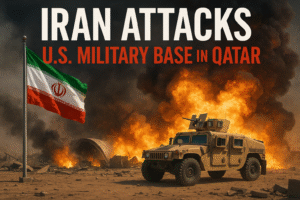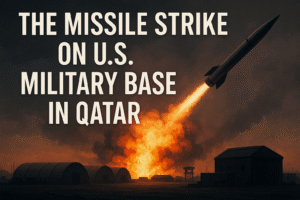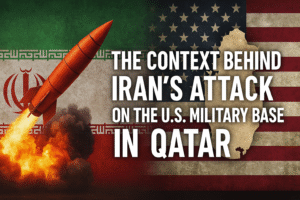Iran Attacks U.S. Military Base in Qatar: A Major Escalation in Middle East Tensions

On June 23, 2025, Iran attacked a U.S. military base in Qatar, launching a missile strike on Al Udeid Air Base. This attack has marked a significant escalation in the already tense political and military standoff between Iran and the United States. Following a series of U.S. airstrikes on Iranian nuclear facilities, Iran’s attack on the U.S. military base in Qatar is seen as a direct retaliation. This action has heightened fears of an all-out conflict in the Middle East, with regional powers and the international community closely monitoring the developments.
The Missile Strike on U.S. Military Base in Qatar

Iran’s Islamic Revolutionary Guard Corps (IRGC) confirmed responsibility for the missile strike on Al Udeid Air Base. Al Udeid is one of the largest U.S. military facilities in the Middle East, serving as a critical hub for U.S. operations in the region. Iran’s attack on the U.S. military base in Qatar is a retaliatory move after the U.S. launched airstrikes on Iranian nuclear sites. The IRGC described the missile strike as a “devastating and powerful” response, indicating the growing military tension between the two nations.
Despite the intensity of the missile attack, Qatar’s air defense systems successfully intercepted the incoming missiles, and there were no reported casualties. However, the significance of Iran’s missile attack on the U.S. military base in Qatar cannot be understated. The Qatari government condemned the attack, calling it a violation of its sovereignty and international law. As a result, Qatar temporarily closed its airspace, suspending flights to ensure public safety amidst the growing tensions.
The Context Behind Iran’s Attack on the U.S. Military Base in Qatar

The missile attack on Al Udeid is not an isolated incident but part of a broader strategy by Iran to assert itself in the region and retaliate for U.S. actions. Iran attacked the U.S. military base in Qatar following U.S. support for Israeli airstrikes on Iranian nuclear sites. Iran has long viewed U.S. military presence in the Middle East as a threat to its national security and has warned that any direct involvement by the U.S. in its conflicts would lead to severe consequences.
Iran’s leadership had previously made it clear that U.S. military bases in Qatar and Iraq are within reach and vulnerable to attack. This missile strike is a clear demonstration of Iran’s military capabilities and its willingness to escalate the situation. The attack also sends a strong message to the U.S. and its allies in the region that Iran is prepared to take bold actions to defend its interests.
The Escalating Conflict Between the U.S. and Iran
The missile strike on Al Udeid Air Base represents a new phase in the ongoing conflict between the U.S. and Iran. This attack follows a series of provocations, including U.S. airstrikes on Iranian nuclear facilities and Iran’s increasing support for militias in Iraq and Syria. Iran’s attack on the U.S. military base in Qatar signals that Tehran is not willing to back down in the face of American pressure.
With the U.S. maintaining a strong military presence in the region, including key bases in Qatar and Iraq, Iran’s action raises concerns about the potential for a wider conflict. The U.S. has already responded with increased military readiness, and it remains to be seen how both sides will de-escalate or further escalate the situation.
The Role of Military Bases in the Conflict
U.S. military bases, including Al Udeid in Qatar, have long been a focal point in the conflict between the two nations. Iran has repeatedly targeted U.S. bases in the region, and Iran’s missile strike on the U.S. military base in Qatar underscores the vulnerability of these installations. The U.S. presence in the Middle East has been a source of tension for years, and Iran’s latest attack highlights the risks of maintaining a large military footprint in the region.
The U.S. military, despite its technological superiority, remains exposed to missile threats. This vulnerability is compounded by the fact that Iran has developed increasingly advanced missile systems capable of targeting U.S. bases across the region. The recent attack is a stark reminder of the security risks posed by the continued presence of U.S. forces in such a volatile area.
What Does This Mean for the Future of U.S.-Iran Relations?
Iran’s attack on the U.S. military base in Qatar could have long-lasting implications for U.S.-Iran relations. With both countries now in a direct military confrontation, the path to peace seems increasingly difficult. While diplomatic efforts may continue behind the scenes, the recent missile strike signifies a shift toward more direct military engagement.
The growing hostility between the two nations has already led to a destabilization of the broader Middle East region, with other countries like Saudi Arabia and Israel watching closely. The escalation of hostilities raises concerns about the potential for a wider regional conflict involving other U.S. allies, as well as the broader international community.
International Reactions to Iran’s Attack
The international community has expressed grave concern over the recent missile strike. The United Nations has called for an immediate ceasefire and urged both Iran and the U.S. to de-escalate the situation. Several European nations, including the United Kingdom and France, have condemned the missile attack and called for renewed diplomatic negotiations to prevent further escalation.
Saudi Arabia, a key U.S. ally in the region, has also expressed concern about the growing tensions. The kingdom has a vested interest in preventing the conflict from spilling over into a wider war, as it could destabilize the entire region and impact oil production.
The Risk of Further Escalation
The missile attack on Al Udeid is just one of several flashpoints in the region. Experts believe that Iran’s attack on the U.S. military base in Qatar could lead to more aggressive actions from both sides. Iran may continue to target U.S. bases and interests in the region, while the U.S. could escalate its military presence or retaliate with more airstrikes.
The risk of a wider war remains high, and the next few weeks could be critical in determining the course of the conflict. Both sides are already on high alert, and any further attacks could lead to a broader military confrontation.
Conclusion
Iran’s attack on the U.S. military base in Qatar marks a dangerous escalation in the ongoing conflict between the two powers. While the immediate impact of the missile strike has been limited, the broader implications for U.S.-Iran relations are profound. The attack underscores the vulnerability of U.S. military installations in the region and highlights Iran’s growing military capabilities. As tensions continue to rise, the international community will be watching closely to see if diplomatic efforts can prevent further violence or if the Middle East is headed toward a larger, more destructive conflict.

